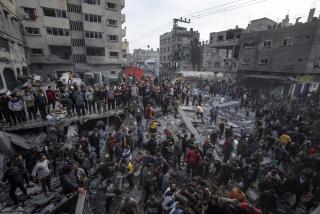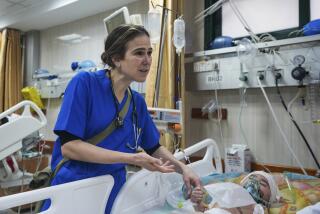The 2,000 dead aren’t the only victims
- Share via
THE YOUNG MAN with the missing arm was walking down the street with his head down. I was in the car, running late. But I registered his crew cut, his missing arm and the tight set of his mouth: someone not thinking happy thoughts. Then the light changed, and I drove on.
A few days later I noticed a different young man, also missing an arm, walking down that same street.
The third time, I figured it out, but only because my 3-year-old daughter piped up from the back seat: “Mommy, why does that man have only one arm?” I looked where she was pointing, and it finally clicked. Sure enough, another young man with only one arm. He was walking past the main gate of the Walter Reed Army Medical Center.
Walter Reed is the military hospital housing many of the soldiers most grievously wounded in Iraq: the young men and women maimed by improvised explosive devices, or IEDs, and suicide bombings; burned and shattered, left paralyzed, blinded or missing limbs.
On Tuesday, U.S. military deaths in Iraq passed the 2,000 mark. The symbolic milestone generated predictable hawkish efforts to downplay its importance. After all, compared to the Vietnam War, which killed more than 58,000 American soldiers, 2,000 dead doesn’t seem like a very big number, does it?
But when comparing Iraq and Vietnam, it’s worth remembering that U.S. deaths in Vietnam didn’t pass the 2,000 mark until 1966, five years into that slowly escalating conflict. Perhaps just as significantly, advances in medical technology mean that more U.S. soldiers survive their wounds today than during the Vietnam era. In Vietnam, about a quarter of seriously wounded soldiers died. In Iraq today, the military death rate from serious wounds is down to about 10%.
That’s good news, but it also obscures both the intensity and the full human cost of the war in Iraq. Because we focus on death tolls, we forget that the war in Iraq has also left thousands of American soldiers permanently disfigured and disabled. Six percent of Iraq war injuries have resulted in amputations -- twice the rate for wounded soldiers in Vietnam. The rate of serious head, neck and face injuries suffered by soldiers in Iraq is estimated to be twice that of soldiers wounded in Vietnam.
As of Friday morning, the Pentagon reported that 7,199 American soldiers had been so badly wounded in action in Iraq that they couldn’t return to duty. And 8,154 returned to duty after less severe wounds. Thousands more soldiers were evacuated from Iraq because of illnesses and noncombat injuries.
The number of soldiers wounded in action isn’t a secret, but it’s not exactly well-advertised, either. Planes transporting wounded soldiers arrive at Andrews Air Force base in the evening, and the wounded are brought to Walter Reed after dark, when passersby and small children are least likely to notice.
You can’t hide the wounded away forever, of course. Still, when my daughter wondered why the young man on the sidewalk had only one arm, I didn’t know how to answer.
I thought of various alternatives:
“That young man has only one arm because molten metal slammed through his body and ripped his arm from his shoulder.” No, not so good for the preschool crowd.
“That young man has only one arm because George Bush, Dick Cheney, Karl Rove, Donald Rumsfeld and others misled the American people.” No, too complicated.
In the end, I settled for the usual half-truths we offer children (and, often, ourselves): “That man is a soldier. He had to fight with some bad people and his arm got hurt. But now he’s in the hospital and the doctors will help him get better.” She looked perplexed, but she nodded, then asked for some apple juice. She hasn’t raised the subject again.
But I’m still wondering, myself.
Wondering how many more young Americans, and how many more Iraqis, will be killed and maimed in the coming months.
Wondering if President Bush will ever admit that this war was based on misinformation and the vicious suppression of dissent.
Wondering whether our continued presence in Iraq is doing more harm than good to the Iraqis and the effort to fight global terrorism.
Wondering when we’ll make a serious plan to start bringing the troops back home.
More to Read
Sign up for Essential California
The most important California stories and recommendations in your inbox every morning.
You may occasionally receive promotional content from the Los Angeles Times.










